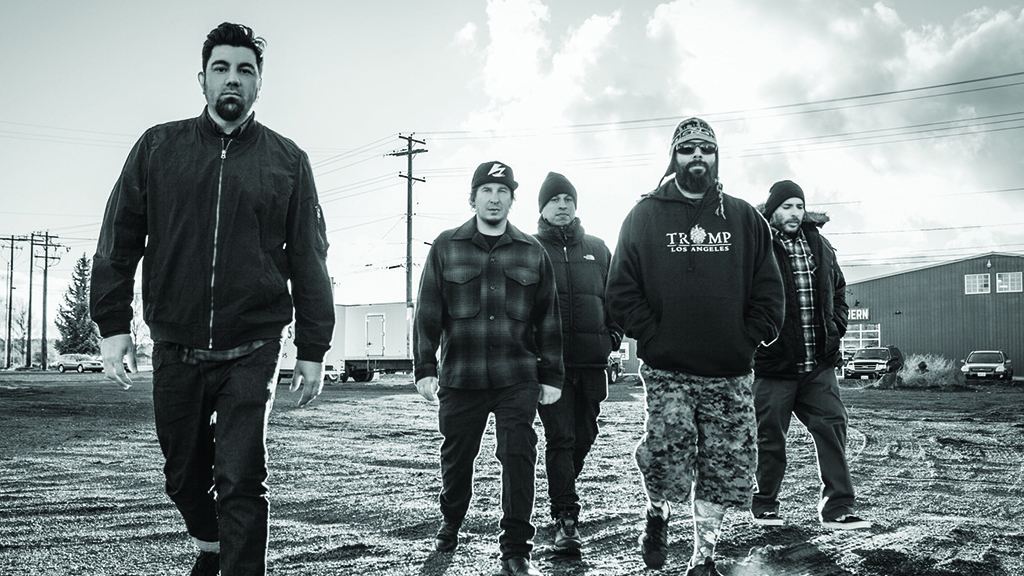Such is the insanely high quality of their recorded output over the last two decades, the question, as you go into the release of a new Deftones album, isn’t wondering whether it will be good or not, but what kind of fantastical sonic mêlée will you be greeted with this time.
Gore is no exception to this rule. It is, as usual, a piece of work that coaxes influence from all manner of genres, that seamlessly melds fragility and brutality into one cohesive organism, exposes itself and seduces the listener more and more with each repeated listen and is so utterly recognisable as the work of its creators that it couldn’t be anyone else. From Chino Moreno’s haunting whisper-to-scream vocals, Abe Cunningham’s punishing yet swinging rhythmic attack and Frank Delgado’s liquid electronic complementary flourishes, every member is on top form. Standard Deftones, then.
But if you think that this makes Gore formulaic or an example of a band slipping into their comfort zone, then think again; Deftones’ yin and yang of shimmering, uplifting melody and simian, primal roaring always throws up many a surprise. Here the Pink Floyd-style, space rock noodling that leads into Hearts/Wires is a creative detour unlike anything the band have ever attempted, until (L)MIRL pulls a similar trick only three tracks later, only this time nodding to the karmic alternative rock of early Jane’s Addiction. It’s a pace that’s visited often, and if you were to compare Gore with an album from Deftones’ back catalogue it would be Saturday Night Wrist, the one considered to be the weakest link in their armoury.
Many of the lo-fi, lurching ideas from that period have been updated and executed with a belief and confidence that was often missing from that album. The title track, for example, plays expertly with unused space and gaps in sound before Stephen Carpenter peels out a trademark metallic riff from nowhere to jaw-dropping effect.
It may not be too much of a shock to hear these approaches creeping back into Deftones’ music. With Gore being the first album recorded since the death of original bassist Chi Cheng, and with Saturday Night Wrist being the final album he contributed to, his spirit looms large over proceedings here. ‘You’re floating out astray/This cold and lifeless body,’ sings Chino on Xenon, and while their comrade is never obviously directly referenced, the sense of melancholic yearning is woven into the fibre of Gore, giving it a heartstring-tugging quality.
If you were expecting something as instantaneous as Swerve City or Rocket Skates from their previous two lauded comeback albums then you may be in for something of a disappointment, with only the stabbing bludgeon of Doomed User coming close – and even then it changes tack and swings in all manner of directions halfway through. If, however, you delight in being challenged, coerced and invited on a journey of oblique emotional mysticism, then Gore is going to be one of your favourite albums of the year. So just your basic, standard Deftones album, then.
Chino Moreno
Vocals
YOU ALL LIVE IN DIFFERENT CITIES NOW: HOW DID THAT IMPACT UPON THE PROCESS?
“Everybody flies into LA, and we’ll go into a rehearsal spot and work. Apart from Stephen [Carpenter], who lives in LA, we were all staying in a hotel, so Sergio [Vega], Abe [Cunningham] and I would meet at 8am in the café and talk about the previous day’s work, and where to go next. One of the most fun parts of being in a band is bouncing ideas off other people. I don’t like to play with myself… No pun intended!”
YOU RECORDED 16 SONGS FOR GORE: WHAT WILL HAPPEN WITH THE EXTRAS?
“Actually we recorded 16 pieces of music, but I only recorded vocals for 12. And then at the last minute I decided to take the first song, Crest, off the record. At this point there’s no plans to revisit the extra tracks, but I never like to make too many predictions about this band!”

